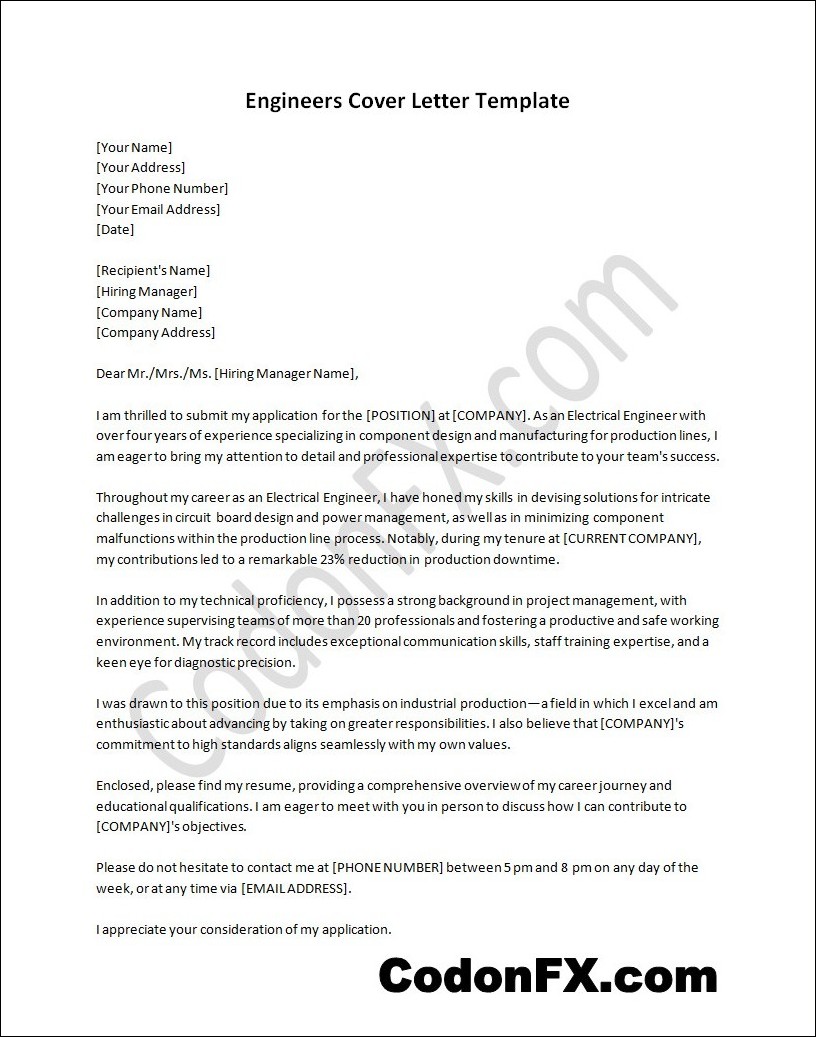
Are you an engineer looking to land your dream job? One essential tool that can help you stand out from the competition is a well-crafted cover letter. It provides you with an opportunity to showcase your passion for engineering and demonstrate why you are the perfect fit for the job.
In this article, we will delve into the world of engineer cover letter templates, exploring their purpose, benefits, and what to include. Additionally, we will provide you with some valuable tips to help you create a compelling cover letter and even offer a sample to guide you along the way. So, let’s dive in and explore the power of a well-written engineer cover letter!
What is an engineer’s cover letter?
A cover letter for engineers is a formal document that accompanies a resume when applying for engineering positions.
The purpose of an engineer’s cover letter is to grab the attention of hiring managers and make a strong first impression. It is your chance to explain why you are interested in the position and how your skills align with the job requirements. In this letter, you can provide specific examples of projects you have worked on, technologies you are proficient in, and any certifications or licenses you hold that are relevant to the engineering field.
A well-crafted engineer’s cover letter can set you apart from other applicants and increase your chances of being invited for an interview. It allows you to customize your application by addressing the specific needs and requirements of the company you are applying to. By demonstrating your passion for engineering and explaining how your skills can contribute to the organization, you can convince the employer that you are the right fit for the job.
Benefits of Engineers’ Cover Letter
Here are some key benefits of including a cover letter when applying for engineering positions:
- Personalized introduction: A cover letter allows engineers to introduce themselves in a personalized manner. It provides an opportunity to address the hiring manager directly, expressing interest in the specific position and the company. By tailoring the letter to the job requirements, engineers can demonstrate their understanding of the role and highlight their relevant skills and experiences.
- Showcasing qualifications: While a resume provides a summary of a candidate’s qualifications, a cover letter offers a platform to delve deeper into specific achievements and experiences. Engineers can use this space to elaborate on their technical expertise, problem-solving abilities, and project management skills, providing concrete examples of how they have successfully contributed to past projects or organizations.
- Demonstrating communication skills: Effective communication is crucial for engineers, as they often need to collaborate with multidisciplinary teams and present their ideas to clients or stakeholders. Including a cover letter allows engineers to showcase their written communication skills, attention to detail, and ability to convey complex information clearly and concisely.
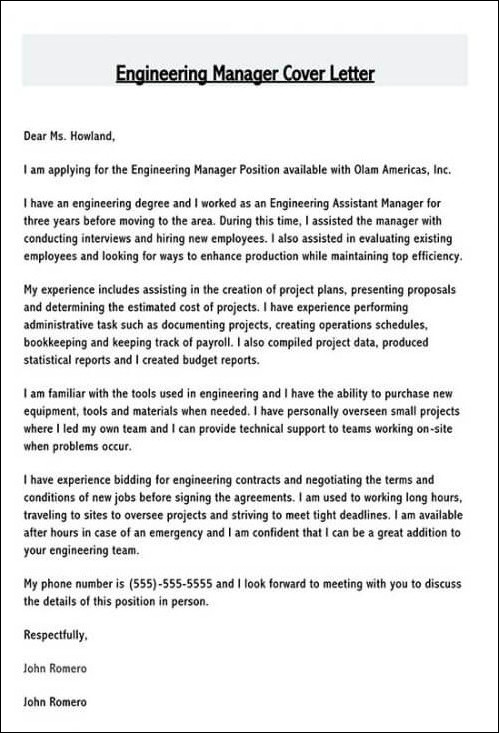
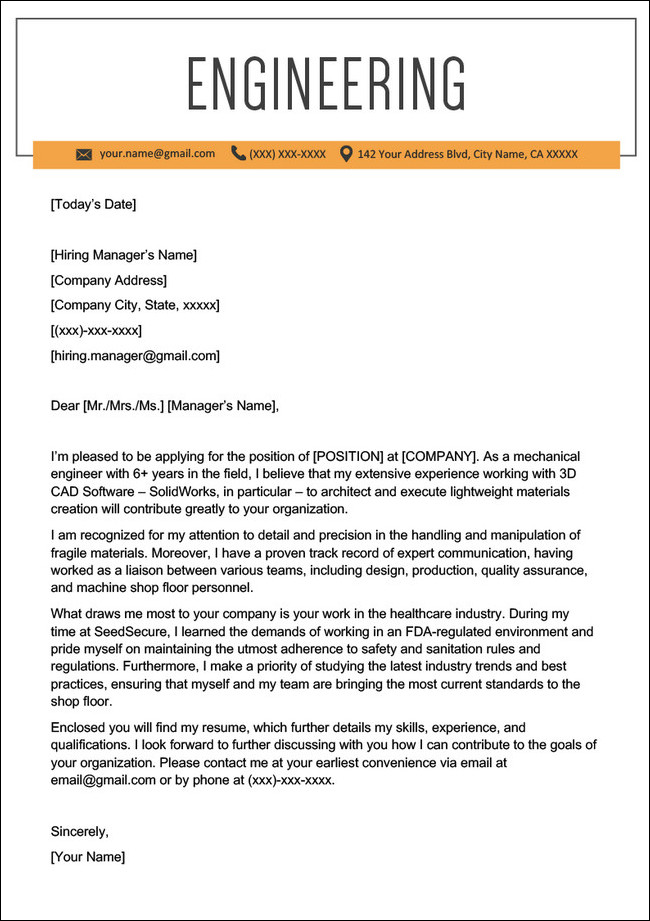
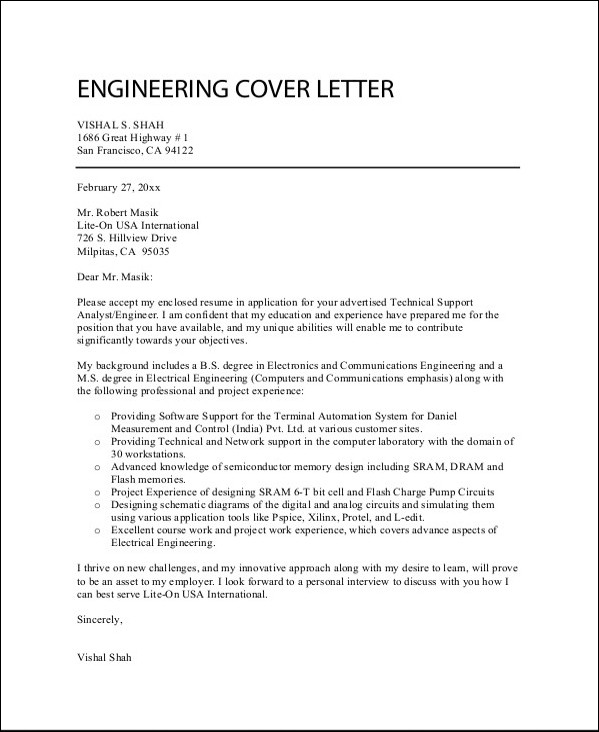
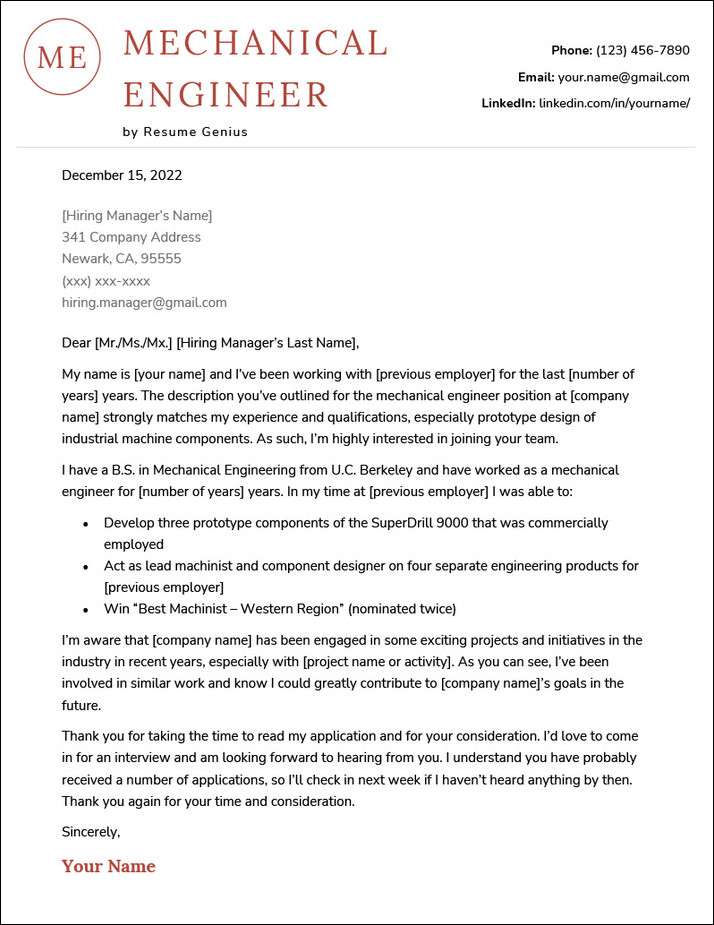
What to include in an engineer’s cover letter?
When writing a cover letter for an engineering position, it is important to include specific information:
- Introduction: Begin your cover letter with a professional greeting and introduce yourself. Mention the position you are applying for and where you found the job posting.
- Summary of qualifications: In the first paragraph, provide a brief overview of your qualifications and highlight your relevant experience. Mention any specific skills or certifications that are required for the job.
- Professional experience: In the body of your cover letter, elaborate on your work experience and how it relates to the position you are applying for. Provide specific examples of projects you have worked on and highlight any achievements or contributions you have made.
- Technical skills: Include a section that emphasizes your technical skills and expertise. Mention any software programs or tools that you are proficient in, as well as any specialized knowledge or training you have received.
- Educational background: Briefly mention your educational background, including your degree, major, and any relevant coursework or research projects. Highlight any academic achievements or honors.
- Personal attributes: Include a paragraph that showcases your attributes and how they make you a strong candidate for the position. This can include qualities such as problem-solving skills, attention to detail, teamwork, and communication abilities.
- Closing: End your cover letter with a polite closing statement and express your interest in the opportunity to further discuss your qualifications in an interview. Thank the employer for considering your application and provide your contact information.
By including these elements, you can effectively demonstrate your suitability for the job and increase your chances of being called for an interview.
Tips to Create an Engineer Cover Letter
Here are some tips to help you craft an effective engineer cover letter:
- Research the company: Before writing your cover letter, take the time to research the company you are applying to. Look for information about their mission, values, and projects they have worked on. This will help you tailor your letter to align with their needs and demonstrate your genuine interest in the company.
- Showcase your skills: Highlight your technical skills and experience relevant to the engineering position. Emphasize any certifications, software proficiency, or specialized knowledge you possess. Provide specific examples of projects you have worked on or challenges you have overcome to demonstrate your expertise and problem-solving abilities.
- Address the job requirements: Carefully read the job description and identify the key requirements for the engineering role. Tailor your cover letter to address these requirements directly. Explain how your skills and experience make you a perfect fit for the position and how you can contribute to the company’s success.
- Show your passion: Express your enthusiasm for engineering and your desire to contribute to the field. Share any personal projects or extracurricular activities that showcase your commitment to continuous learning and development in the engineering field.
- Keep it concise and error-free: Keep your cover letter concise and to the point, typically not exceeding one page. Use clear and professional language, and proofread your letter for any grammatical or spelling errors. A well-structured and error-free cover letter demonstrates your attention to detail and professionalism.
By following these tips, you can create a compelling engineering cover letter that captures the attention of hiring managers and increases your chances of landing your dream job. A well-crafted cover letter can be the key to opening doors to exciting engineering opportunities.
Engineers Cover Letter Template | Word – Download